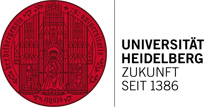Grants and awards
ERC Grants, a Leibniz Prize, a Heisenberg Professorship – researchers at Heidelberg University received numerous highly endowed grants and awards in the past few months. Within the framework of its ‘ZUKUNFT STIFTEN – Empowering the Future’ campaign, the University also created a new endowed professorship for basic and future questions of the state of law:
Being awarded five grant applications, Heidelberg University has achieved an outstanding score with this year’s ERC Consolidator Grant: it is the most successful university in Germany. The European Research Council (ERC) will now award over 10 million euros to Ruperto Carola. The Consolidator Grant is open to promising young researchers whose own independent working group is in the phase of consolidation and deepening. The central funding criterion is academic excellence. “The result is impressive confirmation of the high level of research at our university, also in an international context,” says President Prof. Dr Bernhard Eitel. Meanwhile, the ERC allocated funding to the amount of 2.9 million euros to two young Heidelberg researchers for ERC Starting Grants, which are intended to support the work of excellent junior researchers. The European Research Council funds outstanding scientists in order to drive forward visionary research projects. Scientists from Heidelberg University have earned a total of 43 ERC grants since 2008.
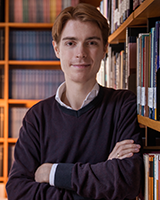
Photo: Schwerdt
Astrophysicist Dr Diederik Kruijssen is receiving an ERC Starting Grant for a project in which he will investigate the physics of star formation in galaxies across cosmic time. The ERC funding totals approx. 1.5 million euros. Since 2016, Dr Kruijssen is leading an Emmy Noether Group at the Institute for Astronomical Computing at the Centre for Astronomy of Heidelberg University (ZAH). The ERC project is scheduled to start in April 2017. The “Multi-Scale Star Formation Across Nascent Galaxies” (MUSTANG) project will focus on star formation in interstellar gas clouds. Dr Kruijssen and his team have developed a new mathematical method that allows them to analyse observational images of galaxies to measure how quickly interstellar gas clouds collapse to form stars and how the young stars then blow out the remaining gas.
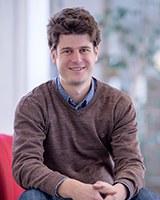
Economist Prof. Dr Florian Diekert is receiving a highly endowed ERC Starting Grant for a project in which the environmental economist is investigating the interactions between humans and nature. The study's primary focus is how changes in the natural environment affect the management of shared resources. ERC funding in the amount of approx. 1.4 million euros is being provided. Florian Diekert is a Junior Professor at the Alfred Weber Institute for Economics of Heidelberg University. In the project entitled "How nature affects cooperation in common pool resource systems“ (Natcoop), Prof. Diekert and his team are investigating how decision-makers respond when ecological systems are threatened or the amount of resources drops. Among other things, they are studying how scarcity affects the ability of various actors to cooperate in the use of shared resources.

Biologist Dr Annika Guse has been awarded an ERC Consolidator Grant for a project in molecular cell biology to investigate the symbiotic relationships between cnidarians such as corals and single-celled algae. The research, which is scheduled to begin in June 2017, will receive ERC funding totalling nearly 2.3 million euros. A portion of the funds will be used to purchase major research equipment. Annika Guse teaches and conducts research at the Centre for Organismal Studies at Heidelberg University. In the ERC-funded project entitled “SYMCELLS – Resolving the molecular mechanisms of intracellular coral-algal symbiosis,” Dr Guse and her team will explore how single-celled algae are taken up as symbionts by their animal host cells. The researchers hope to discover how the cellular functions – such as the exchange of nutrients – of these two different cells are coordinated.
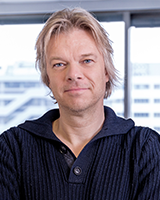
Assistant Professor Dr Frank Postberg is receiving an ERC Consolidator Grant to finance his work for a period of five years, during which he will attempt to determine whether life is possible in the oceans under the surfaces of the icy moons of Jupiter and Saturn. Data from the Cassini-Huygens space probe will be amongst others analysed to determine their habitability. The ERC is providing approx. two million euros in funding. Frank Postberg heads the Planetary Science by Space Missions research group at Heidelberg University's Institute of Earth Sciences. In the project "Habitat-OASIS – Habitability of Oceans and Aqueous Systems on Icy Satellites," Dr Postberg and his team will study mainly the icy moons of Enceladus (Saturn) and Europa (Jupiter). According to the scientist, those locations probably have the highest astrobiological potential in our solar system. Putative hydrothermal activity on the floor of those oceans may offer favourable conditions for life to emerge.
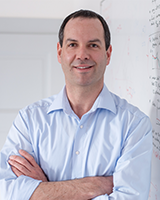
Photo: Schwerdt
Astrophysicist Dr Frank Bigiel is receiving an ERC Consolidator for a project investigating the matter cycle in galaxies. The researcher is particularly interested in how the physical and chemical properties of the interstellar medium "regulate" the birth of stars in galaxies. The approx. 1.7 million euros in ERC funds will support the project over a five-year period. Frank Bigiel teaches and conducts research at the Institute of Theoretical Astrophysics, an arm of the Centre for Astronomy of Heidelberg University (ZAH). Research is set to begin in July 2017. In the funded project entitled "EMPIRE: Galaxy Evolution in the ALMA Era – The Baryon Cycle and Star Formation in Nearby Galaxies," Dr Bigiel and his team will be studying how galaxies form new stars from the gas and dust that make up the so-called interstellar medium. The team will analyse the physical conditions of the interstellar medium such as density and temperature as well as how properties such as galaxy type, mass and rotational behaviour influence star formation.
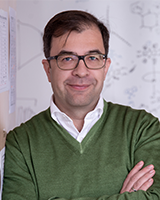
Photo: Schwerdt
Chemist Prof. Dr Michael Mastalerz is receiving a highly endowed ERC Consolidator Grant that will be used to fund a project in which the scientist and his team will be working on the targeted synthesis of soluble, porous materials. The researchers plan to use an innovative synthesis approach to achieve organic cage molecules, which are interesting for use in sensor applications, among others. The research work, which is scheduled to begin in April 2017, will receive ERC funding totalling nearly two million euros. Prof. Mastalerz teaches and conducts research at the Institute of Organic Chemistry of Heidelberg University. In the project entitled "CaTs n DOCs – Chemically and Thermally stable nano-sized Discrete Organic Cages", Prof. Mastalerz and his team will investigate porous materials whose large inner surfaces make them promising for diverse applications, such as separation and storage of compounds or catalysis. Typical materials of this type include three-dimensional networks such as inorganic zeolite and activated carbon as well as the so-called metal-organic frameworks, all of which represent insoluble materials.
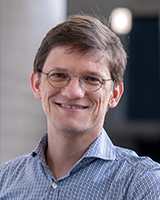
Photo: Schwerdt
Physicist Prof. Dr Selim Jochim has received an ERC Consolidator Grant for a research project in the field of quantum physics. The project's aim is to assemble many-body systems from familiar components and thus simulate the properties of complex quantum systems. The ERC will provide approximately two million euros in funding for a five-year period. Prof. Jochim teaches at the Institute for Physics at Heidelberg University. In 2011, the physicist was the recipient of an ERC Starting Grant. In the ERC-funded “Quantum State Assembler” project, the Heidelberg researchers intend to use these building blocks to assemble systems with widely tunable properties. Using this “quantum simulation”, they will investigate physical systems whose properties are otherwise very difficult to predict. "We hope to contribute to the understanding of effects that have yet to be explained, such as high-temperature superconductivity," states Prof. Jochim. "We may also be able to discover related but completely new phenomena in this way."
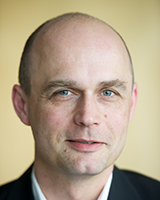
Photo: Wolfram Scheible
Prof. Dr Joachim Spatz, Heidelberg University researcher and Director at the Max Planck Institute for Intelligent Systems in Stuttgart, has been awarded the 2017 Leibniz Prize from the German Research Foundation (DFG) for his outstanding research at the intersection of the material sciences and cell biophysics. The award is Germany's most prestigious research prize. It is endowed with 2.5 million euros earmarked for future research activities. Joachim P. Spatz directs the Biophysical Chemistry Working Group at Heidelberg University’s Institute for Physical Chemistry and heads the New Materials and Biosystems Department at the MPI. The Gottfried Wilhelm Leibniz Prize has been given by the DFG annually since 1986. The German Research Foundation named three women and seven men as the 2017 prize recipients. The awards ceremony will be held in Berlin on March 15th.
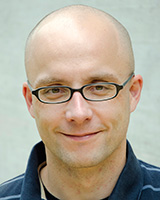
Plant biologist Prof. Dr Thomas Greb has received a Heisenberg Professorship at Heidelberg University. The professorship at the Centre for Organismal Studies (COS) will be funded for a period of five years by the German Research Foundation (DFG) and is a significant honour for the highly qualified young researcher. The award enhances the research field of developmental physiology at the COS. Thomas Greb explores the regulation of growth processes on plant models. His research analyses how environmental influences affect plant development, especially their energy and nutrient balance. "One focus is investigating what influence so-called hormonal signal chains have on intra- and intercellular networks. These signal chains are triggered by changes in sugar levels, among other things," explains Prof. Greb. In addition to the maintenance of stem cell activity, he is investigating how plants integrate the mechanical properties of tissue, such as firmness or elasticity, into the growth process.
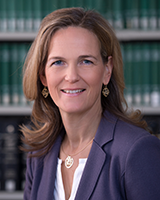
Law Professor Dr Anja Seibert-Fohr, internationally renowned expert in public international law and human rights and Vice Chair of the United Nations Human Rights Committee, is joining the ranks of Heidelberg University. She has been appointed to the Hengstberger Foundation Professorship for contemporary studies of the rule of law at the Heidelberg Faculty of Law. Prof. Seibert-Fohr serves as Director of the Institute for Constitutional Law, Constitutional Theory and Philosophy of Law. Her research at Heidelberg University will consider contemporary and future aspects of the rule of law. The newly created professorship in the field of public law is financed by the Hengstberger Foundation an part of the Ruperto Carola campaign ZUKUNFT STIFTEN.
